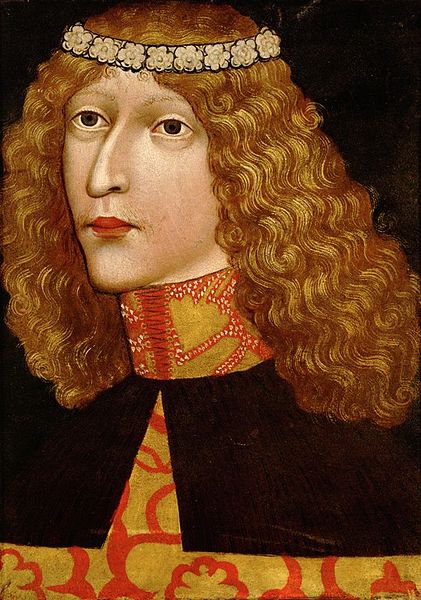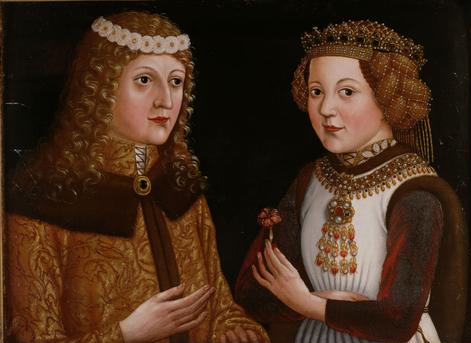<Back to Index>
- Humanist Rodolfo Pio da Carpi, 1500
- Writer Pierre Jules Renard, 1864
- King of Hungary and Croatia Ladislaus the Posthumous, 1440
PAGE SPONSOR


Ladislaus the Posthumous (22 February 1440 – 23 November 1457) was Duke of Austria from 1440, King of Hungary (as Ladislaus V) from 1444 and King of Bohemia from 1453.
The only son of Albert II, King of the Romans, and Elisabeth of Bohemia, daughter of the Holy Roman Emperor Sigismund. He was called Ladislaus Postumus (in Czech Ladislav Pohrobek; in Hungarian Utószülött László; in Slovenian and Croatian Ladislav Posmrtni) because he was born at Komárom (then part of Hungary, now Komárno in Slovakia), four months after his father's death. He succeeded immediately as Duke of Austria and head of the House of Habsburg, and he also became nominal King of Bohemia. But his second cousin Frederick V, ruler of Inner Austria, was chosen to succeed Albert II as King of the Romans.
The estates of Hungary elected Władysław III of Poland as King Vladislaus I in succession to Albert II; but the infant Ladislaus' mother had the Hungarian crown stolen from its guardians at Visegrád and brought to Wiener Neustadt by a lady of the court, Helene Kottannerin. According to legend, the cross on the crown is askew because it was damaged in transit as a result. Elisabeth arranged for Ladislaus to be crowned at Székesfehérvár on 15 May 1440.
For safety's sake, she placed Ladislaus under the guardianship of his Habsburg relative Frederick V, who proceeded to hold him as a virtual prisoner in Castle Orth and rule Austria himself. On the death of Vladislaus I at the Battle of Varna on 10 November 1444, the Hungarian estates, despite considerable opposition, elected Ladislaus Postumus as their king and sent a deputation to Vienna to induce Frederick to surrender the child and the Holy Crown, which he refused to do. In the meantime, János Hunyadi acted as regent for Ladislaus in Hungary, while George of Poděbrady performed the same office in Bohemia.
From 1450 the pressure of the Austrian estates to free Ladislaus grew. In 1452, they entered into the Mailberg Confederation under the leadership of Ulrich of Eyczing and Ulrich of Celje and freed Ladislaus by force. Ulrich of Celje the Princely Count of Celje, a Slovenian magnate and heir to Bosnia, the cousin of Ladislaus' mother, prevailed against Eyczing and became the new guardian of the child, effectively ruling in his stead.
On
28 October 1453, at the age of thirteen, Ladislaus Postumus was finally
crowned King of Bohemia, after which he lived mainly in Prague or Vienna. Ulrich of Celje and Ladislaus remained indifferent to the threat posed in Hungary by the Turks, and Ulrich of Celjebe came
increasingly hostile towards János Hunyadi, who was bearing the
main burden of the battles against the Ottomans. On the death of
Hunyadi, Ladislaus made Ulrich of Celje governor of Hungary in October 1456 at the Diet of Futtak. After the Siege of Belgrade, Ulrich of Celje was murdered by László Hunyadi. Ladislaus had the young Hunyadi beheaded on 16 March 1457. This raised such a storm in Hungary that the king had to flee to Prague, where he spent the last months of his life. He died suddenly in Prague on 23 November 1457 while preparing for his marriage to Magdalena of Valois, daughter of Charles VII of France.
It was rumored at the time that his political opponents in Bohemia had
poisoned him; but in the 20th century it was proved that Ladislaus died
of leukemia, not a recognized disease in that period. Ladislaus's cousins Frederick V and Albert VI succeeded him in Austria; Hungary elected Matthias Corvinus, the brother of László Hunyadi, as king; and Bohemia elected George of Poděbrady, the only Hussite ruler of that kingdom.